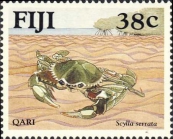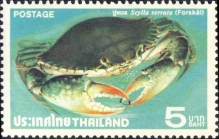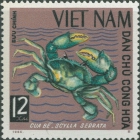WoRMS taxon details
Scylla serrata (Forskål, 1775)
208814 (urn:lsid:marinespecies.org:taxname:208814)
accepted
Species
Achelous crassimanus MacLeay, 1838 · unaccepted > junior subjective synonym
Cancer serratus Forskål, 1775 · unaccepted > superseded combination
Lupea lobifrons H. Milne Edwards, 1834 · unaccepted > junior subjective synonym
Neptunus serratifrons Montrouzier, 1865 · unaccepted > junior subjective synonym
Portunus (Portunus) serratifrons (Montrouzier, 1865) · unaccepted > junior subjective synonym
Portunus leucodon Desmarest, 1822 † · unaccepted > junior subjective synonym
Portunus leucodontes Desmarest, 1817 † · unaccepted > junior subjective synonym
Portunus serratifrons (Montrouzier, 1865) · unaccepted > junior subjective synonym
Scylla tranquebarica var. oceanica Dana, 1852 · unaccepted > junior subjective synonym
- Variety Scylla serrata var. paramamosain Estampador, 1950 accepted as Scylla paramamosain Estampador, 1950 (unaccepted > superseded combination)
marine, brackish, fresh, terrestrial
recent + fossil
(of Cancer serratus Forskål, 1775) Forskål P. (1775). Descriptiones Animalium, Avium, Amphibiorum, Piscium, Insectorum, Vermium; quae in Itinere Orientali Observavit Petrus Forskål. Post Mortem Auctoris editit Carsten Niebuhr. Adjuncta est materia Medica Kahirina. Mölleri, Hafniae, 19 + xxxiv + 164 pp. , available online at https://www.biodiversitylibrary.org/page/2088059 [details] 
Description Habitat: Encountered in mangrove vegetation. Fairly common in unexploited creeks. Heavily collected for food almost...
Description Habitat: Encountered in mangrove vegetation. Fairly common in unexploited creeks. Heavily collected for food almost excusively for tourists <82>. Distribution: extends to Tahiti, including Australia and New Zealand <420>. [details]
DecaNet eds. (2024). DecaNet. Scylla serrata (Forskål, 1775). Accessed through: World Register of Marine Species at: https://www.marinespecies.org/aphia.php?p=taxdetails&id=208814 on 2024-11-21
Date
action
by
![]() The webpage text is licensed under a Creative Commons Attribution 4.0 License
The webpage text is licensed under a Creative Commons Attribution 4.0 License
original description
(of Achelous crassimanus MacLeay, 1838) MacLeay, W.S. (1838). Illustrations of the Annulosa of South Africa. On the brachyurous decapod Crustacea. Brought from the Cape by Dr. Smith. In: Smith, A. (ed.), Illustrations of the Zoology of South Africa; consisting chiefly of Figures and Descriptions of the Objects of Natural History Collected during an Expedition into the Interior of South Africa, in the Years 1834, 1835, and 1836; fitted out by “The Cape of Good Hope Association for Exploring Central Africa”. Published under the Authority of the Lords Commissioners of Her Majesty's Treasury, London, pp. i–iv + 53–71, pls. 2, 3. [details] 
original description (of Cancer serratus Forskål, 1775) Forskål P. (1775). Descriptiones Animalium, Avium, Amphibiorum, Piscium, Insectorum, Vermium; quae in Itinere Orientali Observavit Petrus Forskål. Post Mortem Auctoris editit Carsten Niebuhr. Adjuncta est materia Medica Kahirina. Mölleri, Hafniae, 19 + xxxiv + 164 pp. , available online at https://www.biodiversitylibrary.org/page/2088059 [details]
original description (of Lupea lobifrons H. Milne Edwards, 1834) Milne Edwards, H. (1834-1840). Histoire Naturelle des Crustacés, Comprenant l´Anatomie, la Physiologie et la Classification de ces Animaux. Encyclopédique Roret, Paris; vol I (1834): i-xxxv + 1-468, vol. II (1837): 1-532, vol. III (1840): 1-638, pls. 1–42. <em>Paris, Roret.</em> 2: Text pp. 1–532; Atlas, pp. 1–32, pls. 1–42., available online at http://www.biodiversitylibrary.org/bibliography/16170#/summary [details]
original description (of Portunus leucodon Desmarest, 1822 †) Desmarest, A. G. (1822). Les Crustacés proprement dits. <em>In: Brongniart, A. & A.-G. Desmarest (eds.), Histoire Naturelle des Crustacés Fossiles sous les Rapports Zoologiques et Géologiques. Paris: F.-G. Levrault.</em> Pp. 67–154, pls. 5-11. [details]
original description (of Portunus leucodontes Desmarest, 1817 †) Desmarest, A.G. (1817). Crustacés fossiles. On a désigné sous ce nom et sous ceux de crustacite, carcinite, astacite, astacolithe, ganmarolithe, astacopodium, bacillus, entomolithe, cancer aut pagurus lapideus, cancer petrefactus, etc., les dépouilles ou les empreintes de crustacés que l'on trouve dans les couches de la terre. Nouveau Dictionnaire d'Histoire naturelle, appliquée aux arts, à l'Économie rurale et domestique, à la Médicine, etc., VIII: 495–519. Paris. [details]
original description (of Neptunus serratifrons Montrouzier, 1865) Montrouzier, [X.]. (1865). Description de deux nouvelles espèces de Crustacés des côtes de la Nouvelle-Calédonie. <em>Annales de la Société entomologique de France, sér. 4.</em> 5: 160-162. [details]
original description (of Scylla tranquebarica var. oceanica Dana, 1852) Dana, J.D. (1852). Crustacea, Part I. <em>In: United States Exploring Expedition. During the Years 1838, 1839, 1840, 1841, 1842. Under the Command of Charles Wilkes, U.S.N. C. Sherman: Phildelphia.</em> 13: i-viii + 1-685. [details]
context source (Introduced species) Fofonoff, P.W.; Ruiz, G.M.; Steves, B.; Carlton, J.T. (2014). National Exotic Marine and Estuarine Species Information System (NEMESIS), available online at http://invasions.si.edu/nemesis [details]
context source (HKRMS) Blackmore, G. (1998). The importance of feeding ecology in investigating accumulated heavy metal body burdens in Thais clavigera (Kuster) (mollusca: neogastropoda: muricidae) in Hong Kong. <em>PhD thesis. The University of Hong Kong.</em> [details]
basis of record Crosnier, A. (1962). Faune de Madagascar. XVI Crustaces Decapodes: Portunidae. <em>Faune de Madagascar.</em> 16: 1-154, pls. 1-13. [details] Available for editors [request]
[request]
additional source Webber, W.R., G.D. Fenwick, J.M. Bradford-Grieve, S.G. Eagar, J.S. Buckeridge, G.C.B. Poore, E.W. Dawson, L. Watling, J.B. Jones, J.B.J. Wells, N.L. Bruce, S.T. Ahyong, K. Larsen, M.A. Chapman, J. Olesen, J.S. Ho, J.D. Green, R.J. Shiel, C.E.F. Rocha, A. Lörz, G.J. Bird & W.A. Charleston. (2010). Phylum Arthropoda Subphylum Crustacea: shrimps, crabs, lobsters, barnacles, slaters, and kin. <em>in: Gordon, D.P. (Ed.) (2010). New Zealand inventory of biodiversity: 2. Kingdom Animalia: Chaetognatha, Ecdysozoa, Ichnofossils.</em> pp. 98-232 (COPEPODS 21 pp.). [details] Available for editors [request]
[request]
additional source Liu, J.Y. [Ruiyu] (ed.). (2008). Checklist of marine biota of China seas. <em>China Science Press.</em> 1267 pp. (look up in IMIS) [details] Available for editors [request]
[request]
original description (of Cancer serratus Forskål, 1775) Forskål P. (1775). Descriptiones Animalium, Avium, Amphibiorum, Piscium, Insectorum, Vermium; quae in Itinere Orientali Observavit Petrus Forskål. Post Mortem Auctoris editit Carsten Niebuhr. Adjuncta est materia Medica Kahirina. Mölleri, Hafniae, 19 + xxxiv + 164 pp. , available online at https://www.biodiversitylibrary.org/page/2088059 [details]
original description (of Lupea lobifrons H. Milne Edwards, 1834) Milne Edwards, H. (1834-1840). Histoire Naturelle des Crustacés, Comprenant l´Anatomie, la Physiologie et la Classification de ces Animaux. Encyclopédique Roret, Paris; vol I (1834): i-xxxv + 1-468, vol. II (1837): 1-532, vol. III (1840): 1-638, pls. 1–42. <em>Paris, Roret.</em> 2: Text pp. 1–532; Atlas, pp. 1–32, pls. 1–42., available online at http://www.biodiversitylibrary.org/bibliography/16170#/summary [details]
original description (of Portunus leucodon Desmarest, 1822 †) Desmarest, A. G. (1822). Les Crustacés proprement dits. <em>In: Brongniart, A. & A.-G. Desmarest (eds.), Histoire Naturelle des Crustacés Fossiles sous les Rapports Zoologiques et Géologiques. Paris: F.-G. Levrault.</em> Pp. 67–154, pls. 5-11. [details]
original description (of Portunus leucodontes Desmarest, 1817 †) Desmarest, A.G. (1817). Crustacés fossiles. On a désigné sous ce nom et sous ceux de crustacite, carcinite, astacite, astacolithe, ganmarolithe, astacopodium, bacillus, entomolithe, cancer aut pagurus lapideus, cancer petrefactus, etc., les dépouilles ou les empreintes de crustacés que l'on trouve dans les couches de la terre. Nouveau Dictionnaire d'Histoire naturelle, appliquée aux arts, à l'Économie rurale et domestique, à la Médicine, etc., VIII: 495–519. Paris. [details]
original description (of Neptunus serratifrons Montrouzier, 1865) Montrouzier, [X.]. (1865). Description de deux nouvelles espèces de Crustacés des côtes de la Nouvelle-Calédonie. <em>Annales de la Société entomologique de France, sér. 4.</em> 5: 160-162. [details]
original description (of Scylla tranquebarica var. oceanica Dana, 1852) Dana, J.D. (1852). Crustacea, Part I. <em>In: United States Exploring Expedition. During the Years 1838, 1839, 1840, 1841, 1842. Under the Command of Charles Wilkes, U.S.N. C. Sherman: Phildelphia.</em> 13: i-viii + 1-685. [details]
context source (Introduced species) Fofonoff, P.W.; Ruiz, G.M.; Steves, B.; Carlton, J.T. (2014). National Exotic Marine and Estuarine Species Information System (NEMESIS), available online at http://invasions.si.edu/nemesis [details]
context source (HKRMS) Blackmore, G. (1998). The importance of feeding ecology in investigating accumulated heavy metal body burdens in Thais clavigera (Kuster) (mollusca: neogastropoda: muricidae) in Hong Kong. <em>PhD thesis. The University of Hong Kong.</em> [details]
basis of record Crosnier, A. (1962). Faune de Madagascar. XVI Crustaces Decapodes: Portunidae. <em>Faune de Madagascar.</em> 16: 1-154, pls. 1-13. [details] Available for editors
additional source Webber, W.R., G.D. Fenwick, J.M. Bradford-Grieve, S.G. Eagar, J.S. Buckeridge, G.C.B. Poore, E.W. Dawson, L. Watling, J.B. Jones, J.B.J. Wells, N.L. Bruce, S.T. Ahyong, K. Larsen, M.A. Chapman, J. Olesen, J.S. Ho, J.D. Green, R.J. Shiel, C.E.F. Rocha, A. Lörz, G.J. Bird & W.A. Charleston. (2010). Phylum Arthropoda Subphylum Crustacea: shrimps, crabs, lobsters, barnacles, slaters, and kin. <em>in: Gordon, D.P. (Ed.) (2010). New Zealand inventory of biodiversity: 2. Kingdom Animalia: Chaetognatha, Ecdysozoa, Ichnofossils.</em> pp. 98-232 (COPEPODS 21 pp.). [details] Available for editors
additional source Liu, J.Y. [Ruiyu] (ed.). (2008). Checklist of marine biota of China seas. <em>China Science Press.</em> 1267 pp. (look up in IMIS) [details] Available for editors
 Present
Present  Present in aphia/obis/gbif/idigbio
Present in aphia/obis/gbif/idigbio  Inaccurate
Inaccurate  Introduced: alien
Introduced: alien  Containing type locality
Containing type locality
From regional or thematic species database
Introduced species abundance Brazilian part of the South Atlantic Ocean (Marine Region) : Two specimens of Scylla serrata were collected in Brazil, one in Santos, Sao Paulo State in 1983 (Melo 1983, cited by Tavares 2011), and one on Sepetiba Bay, Rio de Janeiro, in 2011. These occurrences could be either releases of live seafood or ballast water introductions (Tavares and Medonca 2011). [details]Introduced species impact in Hawaiian part of the North Pacific Ocean (Marine Region) : Other impact - undefined or uncertain [details]
Introduced species impact Brazilian part of the South Atlantic Ocean (Marine Region) : Other impact - undefined or uncertain [details]
Introduced species vector dispersal Malaysian part of the Malacca Strait (Marine Region) Individual release: accidental release by individuals [details]
Introduced species vector dispersal Malaysian part of the Sulu Sea (Marine Region) Individual release: accidental release by individuals [details]
Unreviewed
Description Habitat: Encountered in mangrove vegetation. Fairly common in unexploited creeks. Heavily collected for food almost excusively for tourists <82>. Distribution: extends to Tahiti, including Australia and New Zealand <420>. [details]Publication date Date of authority given as 1775 in Serene, 1977 <479>. [details]
| Language | Name | |
|---|---|---|
| English | serrated mud swimming crabserrated mangrove swimming crabmud crabgiant mud crab | [details] |
| German | Gezähnte Mangroven-Schwimmkrabbe | [details] |
| Japanese | アミメノコギリガザミ | [details] |
To Barcode of Life (70 barcodes)
To Biodiversity Heritage Library (12 publications) (from synonym Achelous crassimanus MacLeay, 1838)
To Biodiversity Heritage Library (178 publications)
To Biodiversity Heritage Library (3 publications) (from synonym Lupea lobifrons H. Milne Edwards, 1834)
To Biological Information System for Marine Life (BISMaL)
To Biological Information System for Marine Life (BISMaL) (from synonym Cancer serratus Forskål, 1775)
To European Nucleotide Archive, ENA (Scylla serrata)
To FAO Species fact sheets
To GenBank (674 nucleotides; 440 proteins)
To Global Biotic Interactions (GloBI)
To USNM Invertebrate Zoology Arthropoda Collection (90 records)
To ITIS
To Biodiversity Heritage Library (12 publications) (from synonym Achelous crassimanus MacLeay, 1838)
To Biodiversity Heritage Library (178 publications)
To Biodiversity Heritage Library (3 publications) (from synonym Lupea lobifrons H. Milne Edwards, 1834)
To Biological Information System for Marine Life (BISMaL)
To Biological Information System for Marine Life (BISMaL) (from synonym Cancer serratus Forskål, 1775)
To European Nucleotide Archive, ENA (Scylla serrata)
To FAO Species fact sheets
To GenBank (674 nucleotides; 440 proteins)
To Global Biotic Interactions (GloBI)
To USNM Invertebrate Zoology Arthropoda Collection (90 records)
To ITIS



